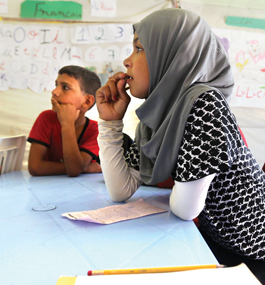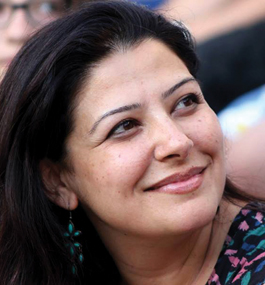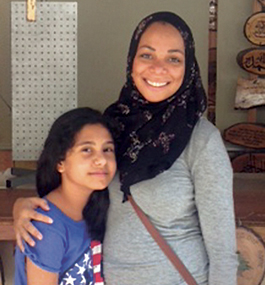Profiles in Courage
Two Heller students found that when children in Lebanon talked about facing their fears, enemies often turned into friends.

Joseph Eid / AFP / Getty Images
by Laurie Covens
Children forced to live amid conflict have the best chance at living peaceful, contented lives as adults, experts say, if they can do one thing: wrest meaning from the chaos.
In Lebanon, generations of children have grown up surrounded by chaos. Even though its violent 15-year civil war ended in 1990, Lebanon today is desperately trying to stay out of the Syrian conflict. Sectarian rivalries between Sunni, Shiite and Christian communities divide its citizens. Suicide bombings are common. The country hasn’t had a president for more than a year. It faces a crippling economic crisis. There are constant water and power shortages. With a population of just 4 million, Lebanon is struggling to absorb nearly 2 million Syrian refugees fleeing bombings, guerrilla battles, al-Qaida and ISIS.
“Lebanon’s children live in a heightened state of fear,” says Iman Abdul-Musawwir, Heller MA’15/MBA’15, who grew up in the relative safety of Boston. “They don’t lead normal lives. They’re not allowed to go outside by themselves or ride a bike. There are periods of calm, and then things erupt with another suicide attack.”
Hanadi Mehdi, Heller MA’15, agrees. She lived through Lebanon’s civil war as a child. She remembers how a simple trip to school or a visit with family could become an ordeal in divided Beirut. Mehdi’s father would have to try to persuade the soldiers guarding a checkpoint to let his family cross. Her mother would distract the children with sandwiches or crossword puzzles, assuring them that the divisions would end and things would get better.
Mehdi says her parents’ unwavering focus on her education — they were determined that nothing would disrupt her schoolwork — helped her see beyond the war. “I learned at a very early age that hope is possible amidst violence,” she recalls.
After meeting as students at Heller, Abdul-Musawwir and Mehdi began to work on an idea for helping Lebanon’s children. For their master’s program in coexistence and conflict (COEX) practicum, they created a storytelling curriculum to encourage sixth-grade students in conflict areas to talk and write about the danger, violence and discrimination that surround them.
Sharing these narratives, the women hoped, would help the students understand one another’s experiences, recognize that they have suffered similar difficulties, feel better about themselves and feel empathy for one another. It might also ease tensions in classrooms where Lebanese children,Syrian children, the children of new refugees and the children of internally displaced families sit side by side.
Last summer, Abdul-Musawwir and Mehdi took their curriculum to two schools in Lebanon, to discover how stories could change sixth-graders’ lives.
Honoring a child’s questions
Though she didn’t live in a war zone, Abdul-Musawwir needed to call upon her bravery growing up.
She was afraid her first day in third grade, she says, when she had to mount the steps of a big orange school bus to go off to a small Islamic private school in the Boston suburbs, leaving her family’s cozy home-school routines behind.
“All the other children at the school had been together for a few years,” she says. “I was new, and had never experienced a conventional school before.”
Three years later, she wrote about having to muster her courage every day for that trip to school. The award-winning essay she penned grew out of her school’s connection with the Max Warburg Courage Curriculum, which asks sixth-graders to share their stories of facing difficulties with resolve, a program inspired by Max Warburg, an 11-year-old Boston boy who lost his brave battle with leukemia.
When Abdul-Musawwir suggested the Courage Curriculum be adapted for students in Lebanon, Mehdi immediately saw the potential.

Hanadi Mehdi
page 2 of 3
“When children tell their stories to one another, it builds a sense of community in the classroom,” Mehdi says. “It gives children a chance for self-expression, especially those burdened by terrible things they have experienced or seen. If teachers know how to support children in this process, it can allow a child to see another child no longer as an enemy but, perhaps, as a friend.”
Frequently, the voices of children are silenced during war, Mehdi says. “When the bombs fall and you must flee, a child’s questions often go unanswered. ‘Why are they bombing us?’ ‘Can I go back and get my toy?’ Storytelling provides a place for them to share these memories and create meaning out of remembered chaos.”
When Abdul-Musawwir and Mehdi arrived in Lebanon last summer, they met with administrators and teachers to present the Courage Curriculum and gain their help in adapting it for their students.
Then they met with the students themselves, to discuss the idea of “courage.” Although English is widely used in most Lebanese schools, most of the Syrian students had never studied it, so the discussions took place in both Arabic and English.
Abdul-Musawwir and Mehdi shared their early experiences with the students. After that, to persuade the children to begin to talk about their own bravery, Mehdi said, “Iman is courageous. She came here all the way from Boston, even though Lebanon is dangerous. What about you? We’d like to hear your story.”
When the students began to talk, says Mehdi, “we found out that most of them had been exposed to some kind of traumatic event, whether loss, death of a close family member, displacement, bombardment, suicide bombing or armed men.”
The violence was etched deeply into their lives, she says. “All of them could identify the names of weapons and had incorporated those names into their play.”
‘A very gigantic explosion’
Schools in conflict zones “can be an extra bulwark against the chaos,” says Professor Mari Fitzduff, founding COEX program director and an expert on the psychological aspects of conflict, whose early work focused on the violence in Northern Ireland.
“But a lot depends on the capacity of a school and its teachers to facilitate difficult conversations among the children,” Fitzduff says. “Teachers need to learn how to listen to someone you disagree with and how to model that for children. A teacher needs to be a neutral mediator, but remaining neutral is difficult without the proper training.”
As a primary-school teacher in Lebanon, Mehdi spent years honing her mediation skills, including the careful use of neutral language when facilitating conversations about sectarian differences. “I learned how to appear voiceless in the conversation,” she explains. “How you distance yourself, and how to react when people say things just to provoke others.”
Over time, under the careful guidance of Abdul-Musawwir and Mehdi, the Lebanon students began to write their stories of courage.
In an essay that has since been nominated for a Courage Curriculum Award, 11-year-old Malak described a suicide bombing near her school in Beirut.
She was listening to her English teacher, she wrote, when she heard “a very gigantic explosion.” Glass windows, a light fixture, a projector and a computer crashed to the floor. Students began screaming; their teacher collapsed. Some children fainted, overcome by fear. Malak’s friend’s head was bleeding. As Malak called out for help while hiding under her desk, a second bomb hit, louder than the first.
A nurse told the students that two car bombs had exploded near the Iranian Embassy, and asked them to evacuate the school immediately. Malak’s mother is a teacher at her school, and her younger brother, Ahmad, is a student there, so she was very worried about them.
Seeing ambulances “passing fastly” and then a crowd of teachers, parents and police, Malak reminded herself “to show bravery in this awful situation, especially because as a Lebanese student I am exposed every minute to serious suicidal and car bombs.”
She also silently asked God to protect her mom and her little brother. When she discovered they were both safe, she ran to hug them, telling her mom, “I love you, and I don’t want to die in this awful way.”

Iman Abdul-Musawwir
page 3 of 3
Malak ended by writing, “Courage is when I wake up every day, going to school knowing that I am surrounded by suicidal and car explosions, and I promise dad that I will achieve my dreams.”
In describing the attack clearly, Malak gained some control over the event. Rather than keeping her shock, fear and worry bottled up inside, she externalized the bombing and her reaction, capturing every detail, and making herself and her readers witnesses to her courage.
“By asking students to find an example of courage in their own lives,” Abdul-Musawwir says, “the essay-writing project helped them unveil their own often forgotten or unnoticed acts of courage. For some, that awakened a bit of confidence and perhaps a bit more optimism about surviving the difficulties in their lives.”
Building confidence and optimism, Abdul-Musawwir says, is the key to helping a child build emotional resilience.
Changes of heart
As they worked with the teachers in Lebanon, Mehdi and Abdul-Musawwir coached them in getting the most out of the storytelling curriculum. Still, last summer was really just a start.
It’s not clear how much the teachers will be able to use the curriculum. Their daily reality includes overcrowded classrooms, too few resources and scant chances for pedagogical training.
“The teachers may not be ready yet to fully take this on,” says Mehdi. “But I tell you, they are thirsty. They are really willing to work on this.”
Several of the teachers continue to seek Mehdi and Abdul-Musawwir’s guidance, and report the storytelling has been beneficial and has helped students connect with one another.
“In Lebanon, we’re brought up to keep quiet about ourselves and our personal experiences,” Mehdi says. “If there was a shooting the night before, teachers don’t discuss it. So you grow up feeling this hunger to talk about what’s really going on. That’s why the kids love creating these stories. It gives them a voice, a way to really talk about what’s happening to them. Besides, when you say, ‘I suffer, too,’ it creates a very different dynamic in the classroom.”
True change becomes possible, Fitzduff says, “when a child realizes that war is a problem for everyone, even those on the opposite side. When a child understands and even empathizes with the victimhood of others, it’s very fruitful.”
As these shifts transform interaction inside the classroom, the results may eventually reverberate beyond school walls. “Bringing children from different communities together can ease demonization,” Fitzduff says. “The children can become friends, and get to know one another’s families. Hopefully, over time, as these relationships mature, personal connections can evolve into tolerance networks that enable people to finally move away from the narrow prejudices of the past.”
Today, Mehdi works for the International Committee of the Red Cross as an interpreter in South Sudan. Asked about the impact of the storytelling project in Lebanon, she offers cautious optimism.
“There’s a big difference between giving families shelter and food, and educating their children,” she says. “The first is humanitarian relief, so it has immediate impact. Helping children tell their stories so they can better understand one another’s history doesn’t change them overnight. Education is a form of development, not relief, so you have to think of it as a long-term investment. And our goal in Lebanon is not small.
“But, ultimately, we hope to help students renounce the culture of violence. That’s why it’s so important for children to tell their stories. The seeds of understanding we plant now can grow stronger over time.”
Laurie Covens is a freelance writer living in Arlington, Mass.
